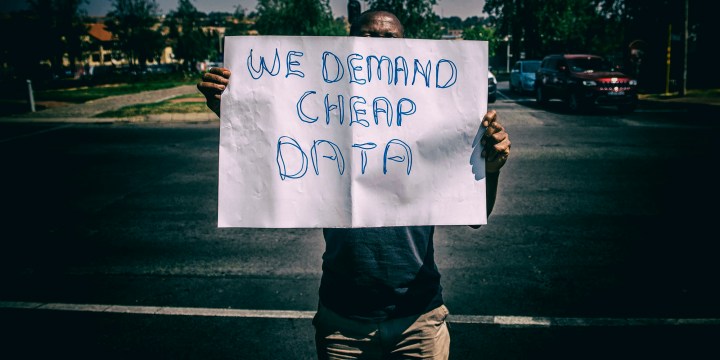DYING FOR CHEAP AIRTIME
Sky-high price of SA cellular services has life-threatening consequences

The Competition Commission has called for cellular services providers to reduce prepaid data costs by more than 30%, but the current prices are so high that this cut may not be enough to make it affordable for the average cash-strapped South African.
Near Durban Deep, close to Roodepoort, a mob had cornered an alleged thief and was planning to kill him. A few wanted to stop the crime before it happened, but no one had airtime to call the police because in this area unemployment is sky-high, children often go hungry, and the cost of a cellphone call is a planned expense.
Eventually, the mob came to a compromise with those trying to save the man. They would teach him a lesson, by “half burning” him. But before the crowd could set the young man alight, help did come. Someone was able to slip away and buy airtime at a shop. The police were called and the man was bundled into the back of a SAPS van and whisked away.
In Durban Deep, such incidents regularly play out, says Cora Bailey, who provides humanitarian support for many in the community. She knows of countless incidents over the years where community members were unable to call an ambulance, because no one had airtime.
For many South Africans, high cellphone charges and data costs are putting them in harm’s way, limiting their access to the economy and, as new research has found, is even having an impact on their political freedom.
Recently, Vodacom and MTN were given an ultimatum by the Competition Commission. The two telecommunications giants would have to reduce their prepaid monthly data by between 30% and 50% or face prosecution in terms of the Competition Commission Act.
But even if MTN and Vodacom were to reduce their prices by as much as the Competition Commission is demanding, at least one advocacy group believes it is still not enough. That advocacy group, the Internet Foundation, suggests that a gig of data should cost no more than 2% of a person’s salary.
The Pietermaritzburg Economic Justice and Dignity Group has calculated that a general worker on a minimum wage and working 19 days a month would earn R3,040. Two percent of that works out to a gig of data costing R60. Both MTN and Vodacom charge R149 for a gig of data.
With cheaper data, people could bypass expensive airtime, using internet-based calls offered by the likes of Skype and WhatsApp. Mervyn Abrahams, the Programme Coordinator for the Pietermaritzburg Economic Justice and Dignity Group, says his organisation sees the effect of high data and cellphone call costs on the poor.
“What we are told from every single focus group that we have conducted over the last three or four years, is that when they ask women what are their essential costs, they describe cellphone costs as critically important,” says Abrahams, who explains that dire economic conditions are forcing members of poor households to travel long distances in search of work.
“We are told that staying in touch is absolutely critical. Often it is a case where grandmothers are taking care of the kids, and the mothers of these children are having to go out and search for jobs.”
The Pietermaritzburg Economic Justice and Dignity Group releases the Household Affordability Index monthly. It examines the costs of goods and services that a typical low-income household has to pay. The index for December records the cost of airtime for a family as R300. Using the comparison of the general worker earning a minimum wage of R3,040, this makes up nearly 10% of that person’s income.
“If they were able to make, let’s say, WhatsApp calls, it would lessen the household expenditure on airtime and wherever households save, that money goes into something critically important,” explains Abrahams. “Generally it goes to two areas: better quality food and education.”
The cost of data has another effect on the poor. Increasingly, politics is playing out on the internet. US President Donald Trump fires off tweets as a means of directly engaging with the American people. In South Africa, political parties are increasingly using Twitter to communicate with their followers.
If you don’t have access online, you increasingly can’t take part in political debate, says Dr Merten Reglitz, a lecturer in Global Ethics at the University of Birmingham.
“At some point, our freedom to associate, our freedom to obtain politically relevant information, free speech, became less valuable, compared to other people who have access to the internet,” says Reglitz.
He believes access to free internet could be key in protecting basic human rights such as life, liberty and freedom from torture. The internet can also hold government and institutions to account, says Reglitz. This happened during the Arab Spring, where the internet was used to report on government atrocities. Using the internet also became important in documenting police violence against African Americans in the US.
Across the globe, there are efforts to provide free internet to the poor.
The Indian state of Kerala recently declared internet access a human right and aims to provide free online use to its 35 million people. The European Union has launched its Wifi4EU initiative which aims to provide every European village and city with free wireless internet access around public centres by 2020.
In South Africa, free internet access for the poor appears a long way off.
“What we need to remember is that communication is no longer a luxury, it is an absolutely essential thing,” says Abrahams. DM




















 Become an Insider
Become an Insider